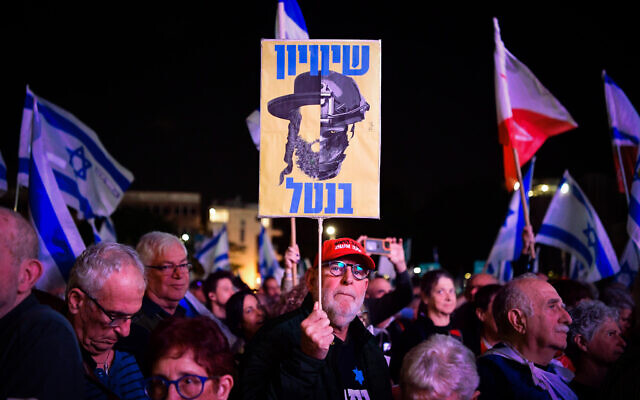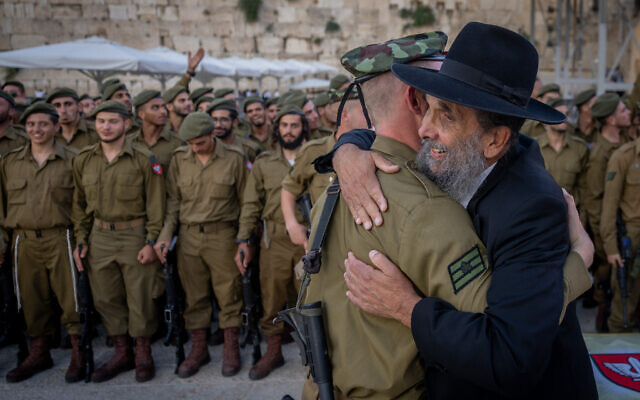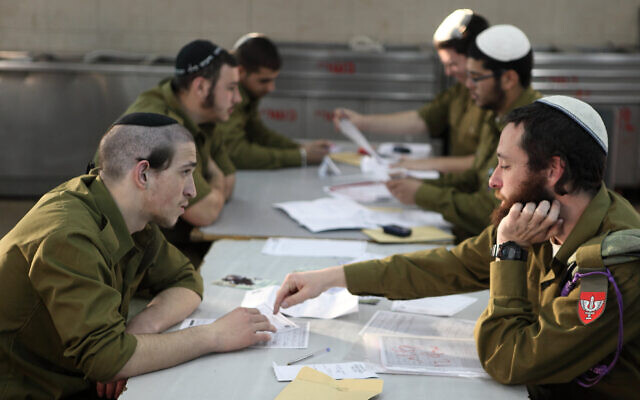On Cowards, Carrots and Excuses... They can drive ambulances and learn to be medics...
As the military issues the first of 7,000 new conscription notices, communal leaders and liars say soldiers coerced into service are liabilities: ‘They would be destroyed in Lebanon or Gaza’

Out of a total of 3,000 draft orders sent over the previous three months, 273 men showed up at the IDF induction center and 48 actually enlisted.
Still, with IDF casualties continuing to rise on the battlefields and Israeli public sentiment bitterly against the sweeping draft exemptions provided to able-bodied Haredi young men, Israel’s Haredi rabbinic leadership is facing the biggest threat to Haredi yeshiva culture since the founding of the State of Israel.
“Never before has the yeshiva world been more besieged and in danger than right now,” Yitzhak Sudri, a Haredi public relations consultant, told the Haredi Kikar Hashabbat internet news site on Thursday.
Public outcry against blanket exemptions for Haredi soldiers has grown since war erupted after Hamas’s October 7, 2023, massacre, which saw some 3,000 terrorists burst across the border into Israel by land, air and sea, killing some 1,200 people and seizing 251 hostages amid acts of brutality and sexual assault.
About 800 IDF soldiers have been killed, over 5,400 injured, and 300,000 called up for reserve duty since the Hamas onslaught. With no end in sight for the war being conducted in Gaza and Lebanon, most Jewish Israelis — Arab Israelis are exempt from military service — are no longer willing to tolerate a situation in which tens of thousands of able-bodied Jewish men avoid taking part in defending the Jewish state.

Ways to begin — and finish — military service as a Haredi Jew
About 66,000 Haredi men aged 18 to 24 have secured exemptions from military service, claiming they devote most of their waking hours to Torah study.
However, according to Yossi Levi, CEO of the Netzah Yehuda Association, which has worked for the past 25 years to encourage Haredi men who aren’t studying Torah to enlist in the IDF, many of these men are only nominally registered in yeshivas and actually work illegally or are idlers.
“According to the most lenient estimates, at least a third of the 66,000 are not in yeshivas,” said Levi.
Asked about the efficacy of sending thousands of draft orders to Haredi men, Levi said there were “two sides” to the argument.
“On one hand, the orders will force guys who aren’t in yeshiva to face the fact that they are criminals. They are cheating and taking advantage of us,” he said. “But on the other hand, sending orders to guys who are serious Torah scholars will only cause damage.”
Levi said that publicly punishing serious yeshiva students would only galvanize Haredi opposition to the draft.
At the same time, Levi said that today there is no excuse for a Haredi young man who is not learning in yeshiva to avoid the draft.
“More than ever before, there is a clear need for more soldiers. And there are plenty of frameworks in the IDF fit for Haredi soldiers, including the Netzah Yehuda Battalion and the new Hasmonean Brigade,” Levi said.
Rabbi David Leybel, one of the Haredi figures behind the creation of the Hasmonean Brigade, said the brigade provides a solution for Haredi parents worried about the spiritual dangers of IDF service.
“What worries most Haredi parents more than anything else about the IDF is that their son will begin military service as a Haredi, but won’t finish that way,” Leybel said. “If there would be a place in the IDF where the Haredi public feels safe both spiritually and culturally, many of the obstacles to Haredi draft will be removed. I believe the Hasmonean Brigade provides precisely that sort of place.”
Creating an entire Haredi brigade with about 2,000 soldiers means more autonomy and control of the environment.
From the beginning of service until the end, Haredi soldiers can be provided with an insular surrounding in which gender segregation is meticulously maintained, glatt kosher food is provided, and soldiers can attend regular Torah classes.
Leybel is now working with the IDF to allow rabbinic supervision of how the new brigade is run and ensuring that a list of conditions is anchored in chief-of-staff directives.
Until now, the largest IDF formation compatible with the Haredi lifestyle has been the Netzah Yehuda battalion, which has about 500 soldiers — not all of whom actually come from the Haredi community. Haredi men who underwent officer training or were required to take various courses were forced to leave the battalion and serve in the vicinity of female soldiers and live in predominantly secular surroundings.
Rebooting the Haredi Zionist narrative
But Leybel said that the main obstacle to drafting a large number of young Haredi men is the non-Zionist, separatist narrative prevalent on the Haredi street.
“There is a narrative within the educational system that we are not part of the general public and if we are not part of the general public then why should we join the IDF?” said Leybel. “We need to change the narrative.”
Leybel said perspectives have changed since October 7.

“There is a sense of guilt and shame among a lot of Haredim because they are not really sharing in the war effort,” he said. “But it’s not enough to really get guys to go out and join the IDF. And there remains a very heavy social stigma on a Haredi guy who joins the IDF.”
Many Haredi men who do enlist face harassment, intimidation and ostracization by their own communities; some are afraid to return home from service while in uniform. One indicator that Haredi opposition to mass induction is still strong is the way the issue is being presented on Haredi news media.
Panels of Haredi commentators that discussed the draft on Haredi news outlets such as Kikar Hashabbat and Radio Kol Chai focused more on the injustice being perpetrated against the Haredi community and yeshiva world than on any sense of self-reckoning or a need to fundamentally change Haredi positions on IDF service.

Many of the commentators, such as Sudri, a former spokesman for the Shas party, recommended shifting the blame for the failure of a Haredi draft to the IDF by claiming it is not prepared to provide the proper spiritual atmosphere for Haredi soldiers.
These Haredi commentators also voiced hope that leftwing organizations would fight their battle for them by petitioning the High Court against the creation of the Hasmonean Brigade because the strict gender separation discriminates against women.
Levi said that consecutive governments have done little over the years to encourage Haredi men to integrate into the IDF.
“Our entire budget at Netzah Yehuda, the oldest and most experienced organization dealing with Haredi enlistment, is NIS 22 million [about $5.9 million] annually, and over 90% of that comes from private donations,” Levi said.
He emphasized that the State of Israel must make the conscription of Haredi men into the IDF “an important national goal.”
“It must build multi-year programs, support existing institutions, encourage outreach to Haredi youth, encourage awareness and provide incentives,” he said.
“These are long-term processes, though,” he added. “You can’t expect a huge change overnight.”





